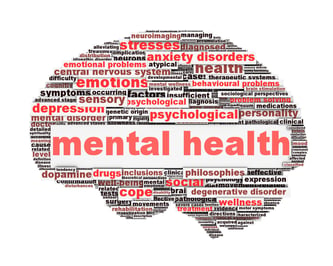 We all experience levels of stress, sadness, depression, anxiety and other emotions in our lives. They are part of who we are as human beings and our natural way of responding to situations. But as many as 1 in 5 people are affected by these expected behaviors and responses turning into a mental health condition. The signs of mental illness are not always obvious, and each mental health condition has its own symptoms. It’s important to be able to recognize the symptoms and to know how to help yourself or someone else who is suffering.
We all experience levels of stress, sadness, depression, anxiety and other emotions in our lives. They are part of who we are as human beings and our natural way of responding to situations. But as many as 1 in 5 people are affected by these expected behaviors and responses turning into a mental health condition. The signs of mental illness are not always obvious, and each mental health condition has its own symptoms. It’s important to be able to recognize the symptoms and to know how to help yourself or someone else who is suffering.
The National Alliance on Mental Illness (NAMI) defines mental illness as a condition that affects a person's thinking, feeling, or mood. Such conditions may affect someone's ability to relate to others and function each day. Each person will have different experiences, even people with the same diagnosis. This is why its not always easy to diagnose a mental health condition, but there are signs to look out for.
Recognize the warning signs
Each illness has its own symptoms, but common signs of mental illness in adults and adolescents can include the following:
- Excessive worrying or fear
- Feeling excessively sad or low
- Confused thinking or problems concentrating and learning
- Extreme mood changes, including uncontrollable “highs” or feelings of euphoria
- Prolonged or strong feelings of irritability or anger
- Avoiding friends and social activities
- Difficulties understanding or relating to other people
- Changes in sleeping habits or feeling tired and low energy
- Changes in eating habits such as increased hunger or lack of appetite
- Changes in sex drive
- Difficulty perceiving reality (delusions or hallucinations, in which a person experiences and senses things that don't exist in objective reality)
- Inability to perceive changes in one’s own feelings, behavior or personality (”lack of insight” or anosognosia)
- Abuse of substances like alcohol or drugs
- Multiple physical ailments without obvious causes (such as headaches, stomach aches, vague and ongoing “aches and pains”)
- Thinking about suicide
- Inability to carry out daily activities or handle daily problems and stress
- An intense fear of weight gain or concern with appearance
Mental illness is often misunderstood. Many people think it’s their fault or the fault of someone around them, but mental illness is not the result of just one event. Research suggests multiple causes, such as genetics, environment and lifestyle can influence the development of a mental health condition.
Even though most people can be successfully treated, less than half of the adults in the U.S. who need services and treatment get the help they need.
Reach Out for Support
If you or someone you know is struggling with a mental health condition, it’s important to know you are not alone and there are resources to help.
- If it's an emergency in which you or someone you know is suicidal, you should immediately call the National Suicide Prevention Lifeline at 1-800-273-8255, call 911 or go to a hospital emergency room.
- Seek out support groups in your community and educate yourself about your symptoms and diagnosis. Social support and knowledge can be valuable tools for coping.
- Join discussion groups, forums or share your story and connect with others who are going through the same thing.
- If you or your child is in school or at college, contact the school and ask about their support services.
- If your symptoms are moderate to severe, make an appointment with a specialized doctor such as a psychiatrist. You may need to contact your community mental health center or primary health care provider for a referral.
At Orchard Hospital, we want to help and educate people about mental illness and do so in a compassionate, judgement-free way. Orchard Hospital Medical Specialty Center - Your Everyday Health Care Clinic - offers mental health services for outpatients with the need or desire to receive mental health treatment.
Our focus is on the total well-being of those whose mental illness or behavioral problems limit their ability to live their lives to their fullest potential. We also offer the same services to those who are interested in learning new coping skills and ways of dealing with everyday stressful situations.
We strive to build trusting, respectful and attentive relationships that define practical goals and plans.
Schedule an appointment today and call (530) 846-9080.



